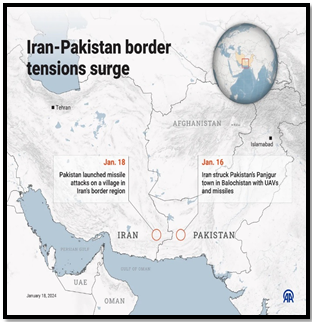REGIONAL WAR CLOUD SHOULDN’T DRIFT EASTWARDS
Syllabus:
- GS 2 : India and its Neighborhood- Relations
Focus:
- The Iran-Pakistan conflict adds another layer to the already volatile West Asia region.
- Historical baggage, proxy wars, and internal pressures fuel tensions.
- China’s neutrality and India’s strategic position add further complexity.
Source: Essanews
What is the Issue?
- Iran and Pakistan’s relationship deteriorated due to recent missile and drone attacks by Iran on alleged Jaish al-Adl bases in Pakistan’s Balochistan province.
- Pakistan strongly condemned the attacks as a violation of its sovereignty and retaliated with its own cross-border missile strikes on alleged terrorist sanctuaries in Iran.
- This escalation of tensions between the two countries threatens regional stability and security.
| About Jaish al-Adl?
· Jaish al-Adl is a Sunni militant group formed in 2012, primarily comprising ethnic Baluch members from both Iran and Pakistan. · The group aims to seek independence for Iran’s Sistan province and Pakistan’s Baluchistan province, advocating for the rights of the Baluch people, who face discrimination and unequal distribution of resources. · Jaish al-Adl’s presence in Balochistan has fueled tensions between Iran and Pakistan, both of which have accused each other of supporting militant activities in the region. |
Historical Context:
- Shared Past: Iran and Pakistan share a long history dating back to ancient empires, though recent decades have seen strained relations.
- Pre-Revolution Ties: Both countries were allies with the US and supported each other during conflicts.
- Post-Revolution Shift: Iran’s 1979 revolution and US sanctions led to a cooling of relations.
Evolution of Iran-Pakistan Relationship:
- Pre-1979 Alliance:
- Before Iran’s 1979 Islamic Revolution, both Pakistan and Iran were staunch allies of the United States.
- They joined the Baghdad Pact in 1955, later known as CENTO, modeled after NATO.
- Iran supported Pakistan with material and weapons during its wars against India in 1965 and 1971.
- Post-1979 Shift:
- The Islamic Revolution in Iran led to a conservative Shiite regime under Ayatollah Khomeini, coinciding with Pakistan’s Islamization under General Zia-ul-Haq.
- They found themselves divided along sectarian lines.
- Geopolitical Differences:
- Iran became a sworn enemy of the United States after 1979, while the U.S. embraced Pakistan.
- Iranian distrust of Pakistan grew after 9/11 due to Islamabad’s strong support for the U.S. “War on Terror.”
- Iran’s policy of exporting revolution alarmed its Arab neighbors, complicating its relations with Pakistan.
- Attempts at Reconciliation:
- Despite historical tensions, efforts were made to improve ties, such as Prime Minister Benazir Bhutto’s regret over tightening U.S. sanctions against Iran in 1995.
- Relations soured after General Pervez Musharraf came to power in 1999.
Current Issues:
- Proxy Wars: Iran supports Shia groups while Pakistan backs Sunni militants, fueling regional instability.
- Baluchistan Tensions: Both countries exploit resources in Baluchistan while neglecting development, leading to separatist movements and mutual support for rebel groups.
- Escalating Conflict: Recent attacks by Iran’s proxies (Hezbollah, Houthis) and Israel’s retaliation have drawn Iran and Pakistan into the conflict.
- Domestic Pressures: Economic woes and public discontent in both countries increase the risk of further escalation.
- China’s Ambiguous Role: Maintains close ties with both Iran and Pakistan, but remains silent on the current conflict.
Implications :
- Escalating tensions between Pakistan and Iran could destabilize the region, given the complex geopolitics of the Middle East and South Asia.
- Strained relations may affect diplomatic, economic, and cultural ties between the two countries.
- Both Pakistan and Iran are accused of supporting proxies in regional conflicts.
- Heightened tensions may increase proxy activities as each country seeks to influence the other’s internal affairs or support factions in regional conflicts.
- Balochistan: Balochistan may experience increased unrest, potentially bolstering Baloch nationalist movements.
- This unrest could have repercussions for local populations and draw in other regional actors, complicating the situation.
- Security Concerns: Escalating tensions could raise security concerns for neighbouring countries, particularly Afghanistan.
- The region already faces security challenges, and heightened tensions may worsen the situation.
- Implications for India: India’s relations with Iran, especially regarding projects like the Chabahar port, may be affected.
- India may need to navigate a delicate diplomatic balance between its ties with Iran and the United States amidst the tensions.
India’s Position :
- Faces a “three-front” challenge with hostile Iran, Taliban-ruled Afghanistan, and China.
- India maintains an “uncompromising position of zero tolerance towards Terrorism.”
- This reaffirms India’s consistent stance against terrorism, especially concerning cross-border terrorism from Pakistan.
- India acknowledged and showed understanding of “actions that countries take in their self-defence.”
- This indicates recognition of the region’s complex security dynamics and a cautious approach to countries’ actions to address security concerns.
Way forward :
- De-escalation and dialogue are crucial to prevent a wider conflict.
- Addressing internal issues like poverty and development in Baluchistan is essential.
- China needs to play a constructive role in mediating the conflict.
- India should carefully navigate the complex regional dynamics.
- Peaceful resolution and addressing root causes are essential for regional stability.
The escalating tensions between Pakistan and Iran pose significant challenges to regional stability. De-escalation and dialogue are crucial, along with addressing root causes like poverty in Baluchistan. India must navigate complex dynamics to uphold its stance against terrorism and foster stability.
Source:
Mains Practice Question:
Discuss the implications of escalating tensions between Pakistan and Iran on regional stability and India’s strategic interests.

 Source: Essanews
Source: Essanews

